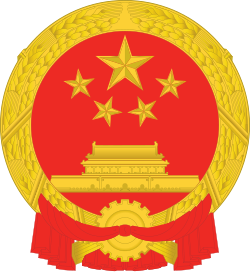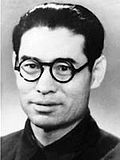This article needs additional citations for verification .(October 2025) |
| 中央人民政府委員會 Zhōngyāng Rénmín Zhèngfǔ Wěiyuánhuì | |
 | |
| Agency overview | |
|---|---|
| Formed | 1 October 1949 |
| Dissolved | 27 September 1954 |
| Type | Highest authority of the Central People's Government |
| Headquarters | Zhongnanhai, Beijing |
| Agency executives |
|
| Child agency |
|
The Central People's Government Council was the highest authority of the Central People's Government of the People's Republic of China. It was established in October 1949 after the founding of the People's Republic of China in accordance with the Common Program of the Chinese People's Political Consultative Conference (CPPCC) and the Organic Law of the Central People's Government. [1] It was abolished in September 1954 due to the adoption of the Constitution of the People's Republic of China and the implementation of the People's Congress system. It only lasted for one term. The Central People's Government Council included the Chairman of the Central People's Government, six Vice Chairmen, and 56 members of the Central People's Government, who were elected by the plenary session of the CPPCC. [2]
Contents
- History
- Membership
- Member of the Central People's Government
- Secretary General of the Central People's Government
- Previous meetings
- References
The Chairman of the Central People's Government was responsible for presiding over the meetings of the Central People's Government Council and leading its work, while the Vice Chairman of the Central People's Government was responsible for assisting the chairman in performing his duties. The council also had a Secretary-General who was elected from within the council. [2]
The Central People's Government Council represented the People 's Republic of China externally and controlled state power internally. It led the Central People's Government as the highest executive body of state affairs. The council was also responsible for formulating the organization of the People's Revolutionary Military Commission of the Central People's Government, the Supreme People's Court of the Central People's Government, and the Supreme People's Procuratorate of the Central People's Government, which served as the highest military command body, the highest judicial body, and the highest procuratorial body, respectively. The Central People's Government Council had a general office and, as needed, set up subsidiary working bodies. [2]




